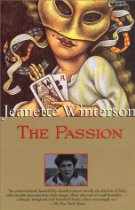
This story of a peasant boy who cooks chickens for Napolean and the cross-dressing card dealer in a Venice, Italy casino is blessed with sparing touches of magical realism, informative research about the time and place(s)that are woven into the author's poetic prose, and a brand of contemplation about life's meanings and mysteries that cannot be taught.
"This morning I smell the oats and I see a little boy watching his reflection in a copper pot he's polished. His father comes in and laughs and offers him his shaving mirror instead. But in the pot he can see all the distortions of his face. He sees many possible faces and so he sees what he might become."
Of Venice, the card dealer Villanelle observes, "This is the city of uncertainty, where routes and faces look alike and are not. Death will be like that. We will forever be recognizing people we have never met.
But darkness and death are not the same.
The one is temporary, the other is not."
The story is rich in such passages and even when they may not ring true, the music seems always pleasing.
"The heart is so easily mocked, believing that the sun can rise twice or that roses bloom because we want them to."
I often recommend "The Passion" to nonfiction readers who say they can't stick with literature, because it is of the highest kind, but taxes only as much as you let it.
Villanelle's dealer's perspective may say it all: "You play, you win. You play, you lose. You play."
No comments:
Post a Comment